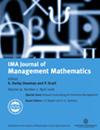Newsvendor decisions under incomplete information:behavioural experiments on information uncertainty
IF 4.3
3区 工程技术
Q3 MANAGEMENT
引用次数: 0
Abstract
Exploring the effects of information uncertainty presents an extensive challenge to decision-makers. This study presents a set of behavioural experiments that examine the impact of incomplete information on newsvendor decisions. Findings show that orders deviate from normative benchmarks when decision makers have incomplete information and this tendency is stronger when the demand distribution is not known. Comparison of decisions under incomplete information against behavioural benchmarks with full and no information reveal that the availability of price and cost information brings decisions significantly closer to normative levels when the underlying demand distribution is unknown. On the opposite spectrum, when demand information is available, not knowing price or cost does not lead to worse decisions. Analysing newsvendor profits under various information conditions, we find participants capture at most 84% of earnings they could have generated if they ordered the normative quantity in high profit margin settings; the corresponding percentage is 51% in low profit margin settings. Our results suggest decreasing uncertainty on the demand distribution has a consistently positive impact on profits, while uncertainty about cost or price does not have a significant effect. Implications of our findings on the differential impact of incomplete information are discussed via the backdrop of the prevalence of newsvendor framework across a wide range of operational decisions.不完全信息下的新闻供应商决策:信息不确定性的行为实验
探索信息不确定性的影响给决策者带来了巨大挑战。本研究通过一组行为实验,研究了不完全信息对新闻供应商决策的影响。研究结果表明,当决策者掌握的信息不完整时,订单会偏离规范基准,而当需求分布不明时,这种趋势会更明显。将不完全信息下的决策与完全信息和无信息下的行为基准进行比较后发现,当基本需求分布未知时,价格和成本信息的可用性使决策更接近规范水平。相反,当需求信息可用时,不知道价格或成本并不会导致更糟糕的决策。通过分析不同信息条件下新闻供应商的利润,我们发现在高利润率环境下,参与者最多能获得他们按规范数量订购所能产生的收益的 84%;而在低利润率环境下,相应的百分比为 51%。我们的结果表明,降低需求分布的不确定性对利润有持续的积极影响,而成本或价格的不确定性则没有显著影响。我们的研究结果对不完全信息的不同影响所产生的影响,将通过新闻供应商框架在各种运营决策中的普遍应用进行讨论。
本文章由计算机程序翻译,如有差异,请以英文原文为准。
求助全文
约1分钟内获得全文
求助全文
来源期刊

IMA Journal of Management Mathematics
OPERATIONS RESEARCH & MANAGEMENT SCIENCE-MATHEMATICS, INTERDISCIPLINARY APPLICATIONS
CiteScore
4.70
自引率
17.60%
发文量
15
审稿时长
>12 weeks
期刊介绍:
The mission of this quarterly journal is to publish mathematical research of the highest quality, impact and relevance that can be directly utilised or have demonstrable potential to be employed by managers in profit, not-for-profit, third party and governmental/public organisations to improve their practices. Thus the research must be quantitative and of the highest quality if it is to be published in the journal. Furthermore, the outcome of the research must be ultimately useful for managers. The journal also publishes novel meta-analyses of the literature, reviews of the "state-of-the art" in a manner that provides new insight, and genuine applications of mathematics to real-world problems in the form of case studies. The journal welcomes papers dealing with topics in Operational Research and Management Science, Operations Management, Decision Sciences, Transportation Science, Marketing Science, Analytics, and Financial and Risk Modelling.
 求助内容:
求助内容: 应助结果提醒方式:
应助结果提醒方式:


